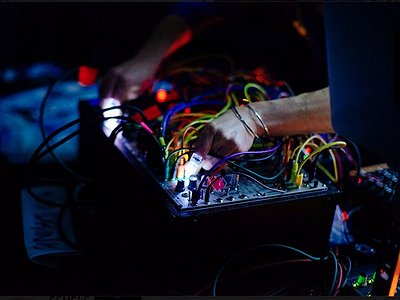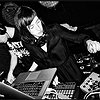Part 2.
Could you describe your creative process on the basis of a piece or album that's particularly dear to you, please? Where do ideas come from, what do you start with and how do you go about shaping these ideas?
Generally my compositions start with an exciting sound or pattern and go from there, but that is not always the case and my most memorable recording was based on my visual work. In 1999 I had a solo exhibition of my paintings at the public art gallery in Hamilton where I live. The exhibition explored the idea of “place” and the images were based on people and places within the city. Richard collaborated with me to create an audio component for the installation based on the interviews and sounds I had gathered as research for the paintings. The audio component of the show was a composition of sounds and voices and much more audio art than music. From these same sound sources and my modular synth, that I was learning how to use, I composed a solo live set of music that I performed at the gallery. I was quite excited about the composition and the performance as I felt that the different sections embodied the feelings of place that I was exploring in the paintings while remaining strongly musical in nature. I started by manipulating the field recordings into loops, drum kits, melodies and drones in Ableton Live and from there, added sounds and patterns from my modular experiments that fit with these starting points. The hour-long set was guided by the layout of the painting exhibition and impressions of different places in the city. The music was improvisational but incorporated a basic structure and direction and marked the first time that I used the modular in a live performance. One of the sections of this live set formed the track First Light on Division, the first Orphx 12” with Sonic Groove which was also an important release for us . After a ten-year hiatus from contributing to the recording aspects for Orphx (I was still playing live and creating some sounds) this track and release also marked my return to collaborating equally with Richard on the Orphx releases.
With more and more musicians creating than ever and more and more of these creations being released, what does this mean for you as an artist in terms of originality? What are some of the areas where you currently see the greatest potential for originality and who are some of the artists and communities that you find inspiring in this regard?
I regularly experiment with new techniques but this is more to maintain my own interest and creativity rather than attempt to find originality. Working with Richard in Orphx for more than twenty years has been an interesting process. He is also constantly challenging the way in which he composes and our sound has gradually changed as the result of the different personal interests that we each bring to the project.
It's important to make sure that you are not looking for inspiration solely within your own genre of music making or closely following or attempting to jump ahead of the trends of the moment. As an artist it's important to have a strong personal vision for your sound and/or concepts. I have always been impressed with the work of Mika Vainio who is constantly shifting his approaches to making sound and composition but has a very unique and personal aesthetic that is easily recognizable within each of his tracks. The label Raster Noton, that has put out some of Mika’s work, is also one that I watch as the artists selected by the label generally fall into this category. I am also currently excited by more integrated sound and visual performances and interested in seeing how new media changes live performance and the types musical compositions that are the result.
[Read our Mika Vainio interview]
How strictly do you separate improvising and composing?
Many of the structured compositions or sounds that I create on my own, with Richard or with other collaborators like Ancient Methods or Jeremy Greenspan are based on, or influenced by, improvisations. I tend to overthink things when composing and I think that the sounds I create while improvising are more engaging and creative. Some kind of improvisation feels necessary as a starting point for a more composed track. Although I can spend endless hours creating sounds in solitude, I enjoy organizing more strongly structured work with others in at least some point of the process, because I can be indecisive and far too critical of my own work. Having someone else take part in the process or listen in at least some stage helps me make better decisions and gain confidence in what I am creating.
How do you see the relationship between sound, space and composition and what are some of your strategies and approaches of working with them?
I try to manipulate sound in the same way that I do the visual elements in my painting by balancing simplicity and chaos in terms of textures, patterns and rhythms, combinations of different harmonies or disharmony, note length and tone. The live performance is what I love most (and often find most challenging) about creating music and this is very influenced by the type of space, atmosphere and energy at a particular venue. The same type of performance can take on an entirely new life in a different space or with a different audience.
What's your perspective on the relationship between music and other forms of art – painting, video art and cinema, for example – and for you and your work, how does music relate to other senses than hearing alone?
I work in both music and visual art (I am also a painter) but I have struggled with combining them both into one art form. One (usually the visual) always seems to overpower the other and the combination takes away from some of the mysteries left open in each type of work. Too much information is provided and there is less for the viewer/listener to create on their own. We stopped using specific visuals for our Orphx live sets because we found that the visuals were directing the viewer towards a certain type of listening or imagining. I am very impressed by performances that can combine these together in a way that creates something new that is not led by one form or the other. Although sound in film generally plays a secondary role to the visuals, a soundtrack that has a strong vision can completely change your experience. David Lynch’s work has always stood out to me in that regard as well as the music and film of John Carpenter.
What's your view on the role and function of music as well as the (e.g. political/social/creative) tasks of artists today - and how do you try to meet these goals in your work?
The artist (musician, painter, filmmaker etc.) creates new experiences. They encourage the viewer/listener to understand the world in a new way, to make new connections and/or question their “place” (historical, cultural, social, political, environmental, psychological, physical, spiritual etc.). Music takes me outside of my day to day. Patterns and rhythms are meditative and I am excited by new combinations of sounds. While I enjoy lyrics, I have a tendency to hear the voice, an element that is often used to guide political or social agendas, as another sound or texture. I have a more physical or emotional engagement with music and social or political critique is usually second to this. The cathartic energy of the heavy rhythms we make as Orphx, create a physical release and the compositions trigger emotional connections for me; but for Richard, who has more interest in examining political and social issues, these aspects of critique are more important.
Listening is also an active, rather than just a passive process. How do you see the role of the listener in the musical communication process?
The listener brings in their own influences and biases to the sounds and compositions that they hear, so that the interpretation of the music will change depending on their location and personal history. As I mentioned, I love live performance and here the relationship between the listener and the music is critical. The live performance is dependant on, and ever changing as a result of, that interaction.
Reaching audiences usually involves reaching out to the press and possibly working with a PR company. What's your perspective on the promo system? In which way do music journalism and PR companies change the way music is perceived by the public?
Unfortunately PR companies have a heavy hand in controlling music, deciding what is heard (by repetition and placement) and how it is heard by putting it into a particular context. Music journalism is different when it is written by someone who is analysing music and making connections between different aspects of music rather than someone who is being paid to make an artist look good – here you have observations made with cultural biases rather than monetary.
Since there is so much music out there, being able to promote yourself has a huge effect on who notices your music regardless of how good it is. This is something that we have had to consider more and more. When we decided to get booking agents for Orphx, our solo projects and collaborations, this made a huge difference to the types of shows that I /we have been able to get and as a consequence of that, the number and profile of the articles published about our music or performances. In the end though, an unexceptional artist is not going to be able to continue for very long on the back of promotion – you need to be able to sustain the interest or respect of your audience through the quality of your music and/or performance.
Do you have a musical vision that you haven't been able to realise for technical or financial reasons – or an idea of what music itself could be beyond its current form?
I have been interested in working with light and music using Arduino or a similar controller as a sound/art experiment or potential live performance.
Explore Christina's work online at www.christinasealey.com






